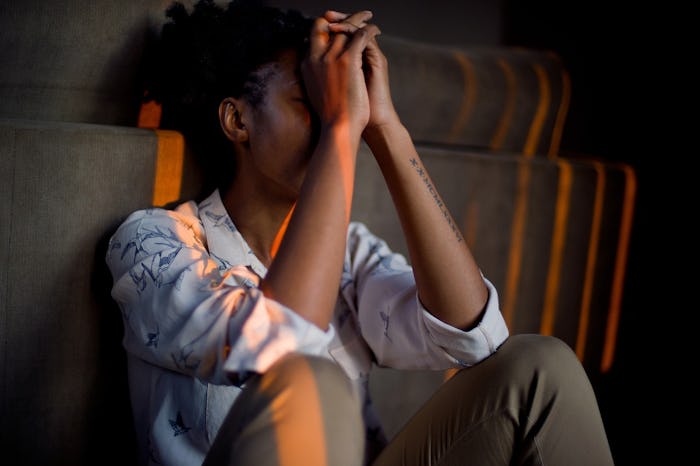I'm pretty sure every new parent has made the joke at some point that going without sleep should be considered a form of torture. In a way, they're not too far off from the truth. Though going without adequate rest may not leave any physical scars, there are plenty of ways lack of sleep can affect your mental health.
You're not imaging things or being dramatic — sleep deprivation has some serious effects. Sure, there are funny, anecdotal moments, like accidentally putting the remote control in the fridge or forgetting where you left your glasses only to find them on your head, but an on-going lack of sleep can be interfere with your life and is decidedly not humorous. In fact, according to the Geneva Convention, sleep deprivation is legitimately considered a method of torture because of the extreme toll it can take on a person's mental well-being.
Ask any parent, veteran or newbie, and they will tell you that interrupted sleep, lack of sleep, and disruptions to their normal sleep schedule can be some of the most difficult aspects of parenthood. So before you try and laugh of your absent-mindedness or convince yourself that you don't really need a full eight hours of sleep every night to be a functioning human, you might want to check out the very real ways a lack of sleep can affect your mental health, and in turn, your life.
1You Struggle To Remember
It can be slightly annoying if your forget something once, but if you are constantly struggling to remember things, it can be extremely frustrating. Dr. Ina E. Djonlagic, an instructor in medicine at Harvard Medical School, told The Huffington Post that when you're sleep-deprived and tired, "the brain has a much harder time absorbing new information." This can take a toll on your mental health since an inability to recall simple details can leave you feeling exasperated and lost.
2Your Stress Levels Increase
Pretty much everyone encounters a stressful situation at least once in their day and most people, albeit begrudgingly, are able to take it in stride. Such is not the case when you're running on low fuel. Christy Matta, a therapist and author, told Psych Central that a lack of sleep, "can lower your stress threshold and routine activities can feel like overwhelming tasks." Being able to cope with everyday frustrations is key to a happy, healthy mental state, and a lack of sleep impairs your ability to manage stress.
3You're Irritable
If people have been calling you grouchy lately, a lack of sleep may be to blame. Dr. George Krucik, a family physician, told Healthline that "your emotions are also affected, making you more likely to have a short temper and mood swings." Feeling like you're in a mental fog where everything is a challenge or a trigger can definitely make you irritable, which isn't fun for you or those you're around.
4Your Reasoning Skills Suffer
Plenty of people have irrational thoughts, phobias, or anxieties, but many are able to mitigate those feelings through coping mechanisms such as reasoning and rationalizing. As noted in Mind, an informational website from the National Association for Mental Health (NAMH) in the United Kingdom, a lack of sleep, "can affect your ability to rationalize anxieties, which can feed into negative thinking patterns associated with mental health problems." So over-tiredness might be the culprit if you feel you've lost your ability to get a handle on your thoughts.
5Preexisting Problems Are Magnified
If you are already living with a mental health issue, psychological condition, or mood disorder, then you probably know how important healthy sleep habits are. In an interview with The Huffington Post, Djonlagic pointed out that, "there is a reciprocal relationship between sleep and anxiety, depression, bipolar disorder, attention-deficit hyperactivity disorder (ADHD) and even post-traumatic stress disorder (PTSD)." That is to say that a lack of sleep seems to exacerbate mental health issues, like the ones mentioned above, and can seriously affect a person's overall mental well-being.
6Your Social Life Takes A Hit
Whether you're an introvert, extrovert, or somewhere in between, having a balanced and healthy social life can brighten almost anyone's mood. Yet fatigue can throw a monkey wrench in your plans. In an article on Psych Central, Matta noted, "sleep deprivation causes decreased optimism, sociability, and creativity," which are all necessary ingredients to a happy mental state. A lack of sleep could definitely be a factor in why your social calendar seems to be suffering.
7You Can Be Combative
You've probably experienced a moments of anger in your life where you want to lash out, but usually you don't act on those feelings. A lack of sleep can change that, though. According to a recent poll taken by the National Sleep Foundation (NSF), the findings showed that, "the 'walking tired' are more likely to sit and seethe in traffic jams and quarrel with other people." Few things can negatively affect your mental health the way anger, arguments, and outbursts can.
